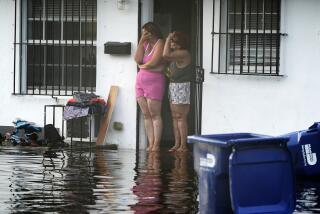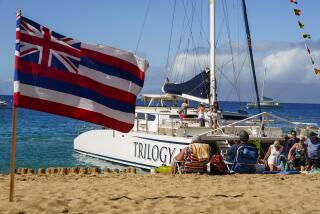Plan on traveling to the wrong place at the wrong time?
- Share via
If the forecasters at the National Oceanic and Atmospheric Administration are right, an ill wind will be blowing this hurricane season -- in fact, lots of ill winds.
When it issued its annual Atlantic hurricane season outlook last month, the agency’s hurricane forecasters predicted “another above-normal hurricane season.” They foresee seven to nine hurricanes for the season, which runs officially from June 1 to Nov. 30. NOAA defines “normal” as a year with six of the storms.
This comes on the heels of last year’s destructive season when nine hurricanes developed, four of which wreaked havoc on Florida’s tourism industry. Hurricanes Charley, Frances, Ivan and Jeanne caused nearly $45 billion in cumulative damage and killed 150 people, most of them in Florida.
Unfortunately, hurricane season coincides with the busy summer travel season, and many vacationers, especially those with families, may have no choice about timing.
If you’re traveling to hurricane territory -- which includes the Caribbean, the southeastern United States, the Bahamas, the Gulf of Mexico and the eastern Pacific -- during the season, you need to have some strategies for coping, whether you’re flying to a resort or taking a cruise.
Safety, though not guaranteed, is enhanced by the slow-moving and relatively predictable nature of hurricane behavior.
Resort areas generally have evacuation plans in case of a hurricane and plenty of warning to implement them. But if you’re stuck on an island, evacuation is not always an option. To put your mind at ease, check with your destination resort or hotel about its preparations and plans.
Club Med, which operates five resorts in Florida and the Caribbean, has a hurricane crisis team at its Coral Gables, Fla., headquarters and someone at each of the resorts to monitor hurricane activity. If a resort is threatened, guests are instructed to remain in their rooms until notified by Club Med personnel.
“All villages have their own generators, water supply, satellite phones and plenty of food for guests and personnel,” said Nancy Uber, a Club Med spokeswoman.
Guests who are subjected to a hurricane receive a “future travel certificate” for the value of the land part of their vacation if the storm strikes.
Storm-tossed flight plans can be problematic for travelers, especially when they have nonrefundable tickets or hotel reservations.
“It was a mess in the Caribbean last year,” said Tim Wagner, spokesman for American Airlines, the largest carrier in the region.
“We have what we call a customer comfort policy that we usually implement when we know about bad weather that allows people to make a change to their itinerary without the normal change fee.”
And what if an airport is closed for an extended period or a resort is destroyed?
“In those instances, we make a case-by-case decision to refund tickets or, in other less onerous incidents, maintain the price paid for the fare as a voucher for future travel,” he said.
The only thing more restrictive than a nonrefundable airline ticket is a nonrefundable airline ticket purchased on an opaque travel website such as Priceline or Hotwire. These sites warn you that any purchase made through them is a done deal -- no ifs, ands or buts.
“Hotwire reservations in general are nonchangeable and nonrefundable,” said Amy Bohutinsky, a Hotwire spokeswoman. “That said, in the case of a natural disaster, individual companies allow customers who are directly affected by the disaster to make changes, and Hotwire customers are covered.”
Priceline has the same policy.
“The suppliers themselves allow us to implement whatever cancellation policy they have, and that will differ, depending on supplier,” said Brian Ek, a Priceline spokesman. Last year, “we refunded a lot of money.”
Cruise passengers may be more protected; their floating resort can simply scoot out of the way.
“I think the safest place to be is on a ship,” said Bob Dickinson, president of Carnival Cruise Lines, the world’s largest operator of cruise ships. “The fundamental thing is the fact that we are maneuverable and nimble. We can move much faster than any hurricane.”
Itineraries can be rearranged to keep ships out of harm’s way.
In a normal year, two or three cruises are affected, Dickinson said.
“A year like last year there were probably 15 to 16,” he said.
In extreme cases, the port of embarkation may be closed, and a cruise may be delayed. Some incoming passengers might even be cheering for such a delay.
“They get extra time cruising, and we take care of arrangements to get them home and give them a discount on a future cruise as well,” Dickinson said.
Some of the potential for aggravation can be avoided during hurricane season by taking some simple, practical steps.
“If you’re traveling during a season when weather could impact your trip, be there at least 24 hours early,” said Judy Lucas, a cruise expert with Concierge Cruises and Tours, based near Tucson. “That way you’re not going to miss your ship.”
Even if you are only 150 miles from port, remember that the plane coming to get you may be delayed by weather in other parts of the country.
Other strategies for those with some flexibility include choosing a southern Caribbean itinerary, where hurricanes strike with less frequency, Lucas said, or going in November or early December before Christmas. Thanksgiving week is a good time to plan a family cruise because most people want to be home for the holiday.
“Have your celebration on the ship, and have someone else do the cooking and cleaning,” Lucas said.
Not a bad suggestion: You can avoid hurricanes and the Thanksgiving dishes.
Jane Engle is on vacation. James Gilden can be reached at www.theinternettraveler.com. Comments on Travel Insider columns can be directed to him or to travel@latimes.com or Travel Insider, Los Angeles Times, 202 W. 1st St., Los Angeles, CA 90012. We regret that we cannot respond individually.
More to Read
Sign up for The Wild
We’ll help you find the best places to hike, bike and run, as well as the perfect silent spots for meditation and yoga.
You may occasionally receive promotional content from the Los Angeles Times.






